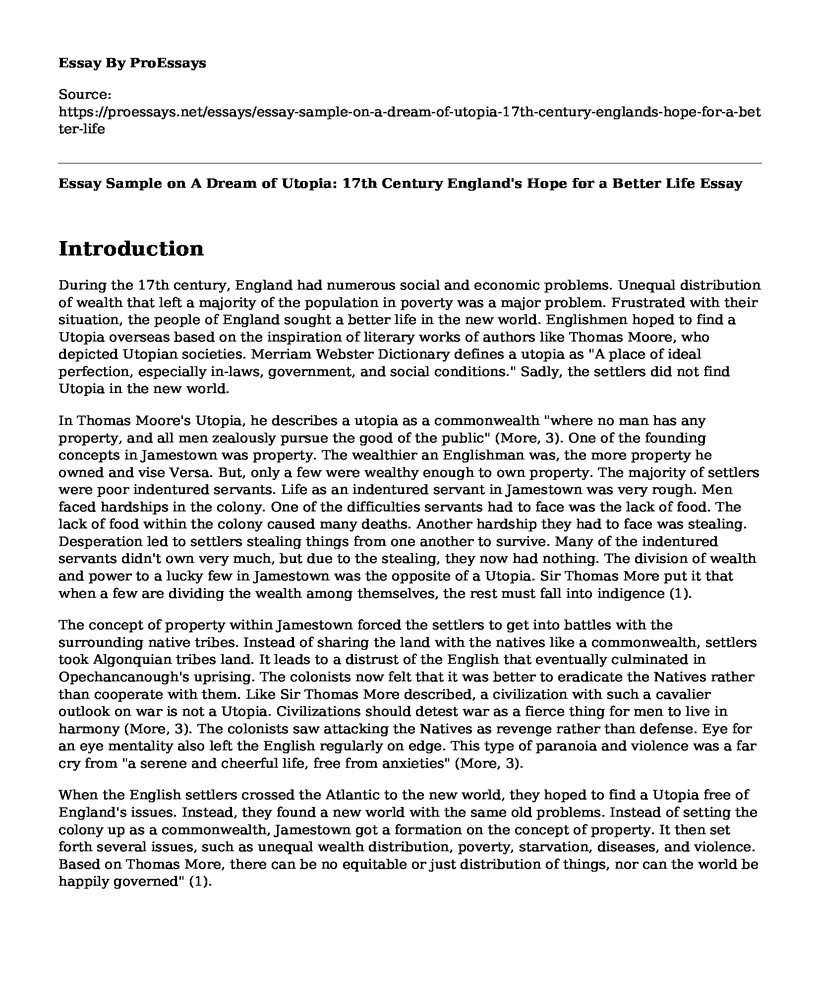Introduction
During the 17th century, England had numerous social and economic problems. Unequal distribution of wealth that left a majority of the population in poverty was a major problem. Frustrated with their situation, the people of England sought a better life in the new world. Englishmen hoped to find a Utopia overseas based on the inspiration of literary works of authors like Thomas Moore, who depicted Utopian societies. Merriam Webster Dictionary defines a utopia as "A place of ideal perfection, especially in-laws, government, and social conditions." Sadly, the settlers did not find Utopia in the new world.
In Thomas Moore's Utopia, he describes a utopia as a commonwealth "where no man has any property, and all men zealously pursue the good of the public" (More, 3). One of the founding concepts in Jamestown was property. The wealthier an Englishman was, the more property he owned and vise Versa. But, only a few were wealthy enough to own property. The majority of settlers were poor indentured servants. Life as an indentured servant in Jamestown was very rough. Men faced hardships in the colony. One of the difficulties servants had to face was the lack of food. The lack of food within the colony caused many deaths. Another hardship they had to face was stealing. Desperation led to settlers stealing things from one another to survive. Many of the indentured servants didn't own very much, but due to the stealing, they now had nothing. The division of wealth and power to a lucky few in Jamestown was the opposite of a Utopia. Sir Thomas More put it that when a few are dividing the wealth among themselves, the rest must fall into indigence (1).
The concept of property within Jamestown forced the settlers to get into battles with the surrounding native tribes. Instead of sharing the land with the natives like a commonwealth, settlers took Algonquian tribes land. It leads to a distrust of the English that eventually culminated in Opechancanough's uprising. The colonists now felt that it was better to eradicate the Natives rather than cooperate with them. Like Sir Thomas More described, a civilization with such a cavalier outlook on war is not a Utopia. Civilizations should detest war as a fierce thing for men to live in harmony (More, 3). The colonists saw attacking the Natives as revenge rather than defense. Eye for an eye mentality also left the English regularly on edge. This type of paranoia and violence was a far cry from "a serene and cheerful life, free from anxieties" (More, 3).
When the English settlers crossed the Atlantic to the new world, they hoped to find a Utopia free of England's issues. Instead, they found a new world with the same old problems. Instead of setting the colony up as a commonwealth, Jamestown got a formation on the concept of property. It then set forth several issues, such as unequal wealth distribution, poverty, starvation, diseases, and violence. Based on Thomas More, there can be no equitable or just distribution of things, nor can the world be happily governed" (1).
Conclusion
Life did not get any easy for the English men. They had hoped to find a Utopian land to deal with problems in England but that was not the case. The reality of the world is that Men must always encounter hardships in their survival.
Reference
More, T. (1965). Utopia, (p. 8). Harmondsworth, UK: Penguin.
Cite this page
Essay Sample on A Dream of Utopia: 17th Century England's Hope for a Better Life. (2023, Feb 09). Retrieved from https://proessays.net/essays/essay-sample-on-a-dream-of-utopia-17th-century-englands-hope-for-a-better-life
If you are the original author of this essay and no longer wish to have it published on the ProEssays website, please click below to request its removal:
- Persuasive Appeal Paper Example
- Literary Analysis Essay on "A House of My Own" by Sandra Cisneros and "Shooting an Elephant" by George Orwell
- Special Purpose Districts in Texas - Essay Sample
- Research Paper on Single Parenthood: Causes, Prevalence and Challenges
- Essay Example on Employees' Rights: Equal & Just Treatment, Safer Workplace, Liberty from Retaliation
- Social Media Use - Essay Example
- Example on Reflecting Upon My Lessons







